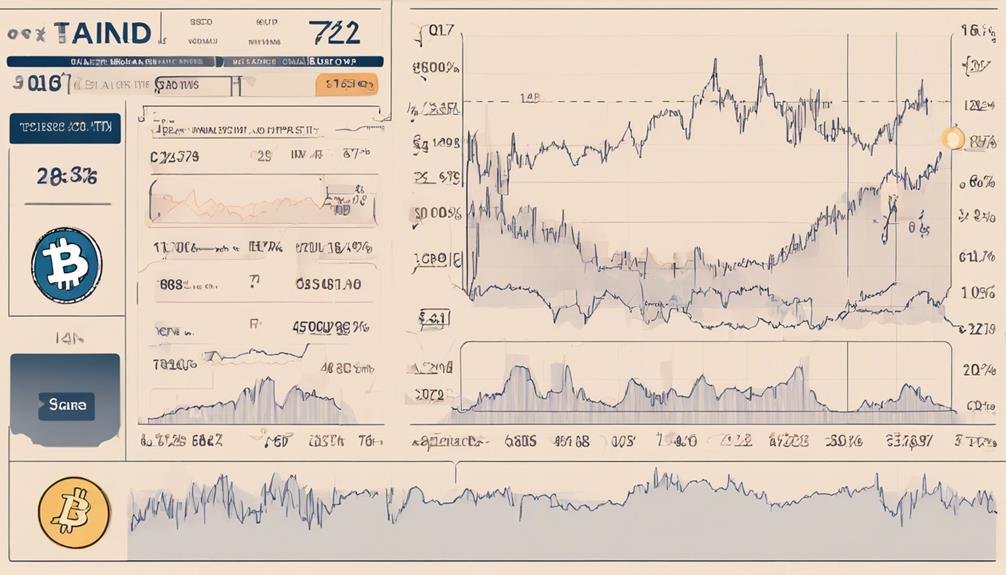Cryptocurrency traders must follow 7 key IRS rules for tax compliance: Cryptocurrency is property, subject to capital gains tax. Taxable events in trading trigger liabilities. Accurate reporting relies on fair market value determination. Exchanges have reporting duties. Proper documentation is essential. Seek specialized tax advice for deductions. Implement strategies to offset gains with losses. Understanding these rules is vital for managing crypto taxes effectively.
Brief Overview of IRS Guidelines for Crypto to Crypto Trades
- Cryptocurrency is treated as property by the IRS for tax purposes.
- Capital gains tax applies to cryptocurrency trades.
- Proper documentation and fair market value determination are essential for accurate reporting.
- Consult with tax professionals specializing in cryptocurrency taxation for guidance.
- Stay updated on IRS regulations regarding cryptocurrencies to ensure compliance.
IRS Definition of Cryptocurrency
The IRS’s classification of cryptocurrency as property rather than currency is essential for determining tax obligations in the realm of digital assets. By defining cryptocurrency as a capital asset, the IRS subjects transactions involving digital currencies to capital gains tax rules. This classification has significant implications for individuals engaged in crypto trade, as it affects the calculation of taxes owed and reporting requirements.
Understanding the IRS’s definition of cryptocurrency is vital for accurate tax filing within the crypto trade sector. Grasping how digital assets are treated under tax laws enables individuals to meet their reporting obligations and comply with the IRS regulations. Hence, grasping the concept of cryptocurrency as property, not currency, is vital for taxpayers dealing with the complexities of tax implications related to their crypto transactions. Proper adherence to the IRS’s classification of digital assets can help taxpayers avoid potential penalties and ensure a smooth tax filing process.
Taxable Events in Crypto Trading

Understanding the IRS’s classifying cryptocurrency as property rather than currency sets the foundation for recognizing the various taxable events in crypto trading. In crypto trading, taxable events include selling cryptocurrency for profit, which triggers capital gains tax. Additionally, using cryptocurrency for purchases incurs taxes on the increased value at the time of the transaction. Accepting cryptocurrency as payment necessitates reporting it as business income, subject to regular income tax rules.
Additionally, cryptocurrency mining results in the mined value being counted as income and taxed accordingly. Recording each taxable event for tax reporting purposes is vital to guarantee compliance with IRS rules. Capital losses in cryptocurrency transactions also have tax implications, as they can offset capital gains, reducing the overall tax liability. Awareness of these taxable events and their impacts is essential for individuals engaged in crypto trading to fulfill their tax obligations accurately.
Determining Fair Market Value

In determining fair market value for cryptocurrency, adhering to the exchange rate from a reputable exchange at the time of the transaction is essential. To guarantee compliance with IRS rules and accurate tax reporting, consider the following:
- Use a consistent valuation method: Taxpayers must employ a reliable approach when determining the fair market value of digital assets to maintain consistency in reporting.
- Utilize third-party sources: In cases where an established exchange rate is unavailable, third-party pricing sources or indices can be used as alternatives to establish fair market value.
- Document valuation meticulously: Accurate documentation is vital for tax reporting purposes. Detailed records of the exchange rate and valuation method employed should be maintained to effectively support the reported gains and losses.
Capital Gains Tax on Crypto Trades

Individuals are subject to capital gains tax on their profits when engaging in cryptocurrency trading, mirroring the taxation principles applied to traditional investments such as stocks. The tax rate for capital gains on crypto trades depends on how long the asset was held before being sold. Short-term capital gains tax rates apply to assets held for less than a year, while long-term rates apply for over a year.
Reporting capital gains from crypto trades is essential for tax compliance and accurate filing with the IRS. Understanding the rules and rates for capital gains tax on crypto trades can help individuals manage their tax liabilities effectively. It is important to note that these gains are considered taxable income and must be reported on the tax return. By staying informed about capital gains and losses, individuals can navigate the complexities of crypto taxation and fulfill their obligations to the IRS.
Reporting Requirements for Exchanges

Exchanges are essential in the cryptocurrency market as they facilitate transactions between buyers and sellers. Exchanges utilize IRS Form 1099-K to report transactions exceeding certain thresholds to the IRS. Compliance with these reporting requirements guarantees transparency and accountability in the taxation of cryptocurrency trades.
Exchange Transaction Records
With the increasing scrutiny of cryptocurrency transactions for tax purposes, specific reporting requirements regarding exchange transaction records are imposed on exchanges.
- Exchanges must provide Form 1099-K if a client exceeds 200 transactions or $20,000 in gross payments.
- Reporting requirements apply to exchanges facilitating over 200 transactions and $20,000 in gross payments.
- Exchanges need to report client transactions meeting the specified thresholds to the IRS.
Failure to comply with IRS reporting requirements can result in penalties for exchanges. Exchanges must guarantee compliance by accurately documenting and reporting transaction details such as dates, types, gross payments, and client information. Maintaining thorough records and meeting reporting thresholds are essential to avoid the consequences of failure to comply with these regulations.
IRS Form 1099-K
To guarantee compliance with IRS reporting requirements, cryptocurrency exchanges utilize IRS Form 1099-K to document and report transactions for clients exceeding 200 transactions and $20,000 in sales. This form is essential for exchanges to meet their reporting obligations and provide the IRS with vital information on clients’ cryptocurrency transactions, aiding in tax compliance and enforcement.
Clients receiving Form 1099-K from exchanges must accurately include the reported details in their tax filings to ensure proper reporting. Failure to report these transactions can result in penalties and legal consequences, emphasizing the importance of adhering to tax regulations in the cryptocurrency space. Both exchanges and clients must understand and fulfill their obligations to avoid potential issues with the IRS.
Treatment of Crypto Mining Income

When considering the tax implications of cryptocurrency mining income, it is essential to recognize that the IRS treats such earnings as ordinary income. Here are key points to understand:
- The fair market value of the cryptocurrency mined is used to determine the taxable amount.
- Miners must report the value of the mined cryptocurrency as income on their tax returns.
- Expenses related to mining activities, such as equipment and electricity costs, may be deductible to offset the taxable income.
Proper record-keeping of mining activities and associated expenses is vital for accurate tax reporting. By maintaining detailed records, miners can substantiate their income and expenses in case of an IRS audit. Miners need to stay compliant with IRS rules regarding the reporting of crypto mining income to guarantee they fulfill their tax obligations accurately.
IRS Guidance on Crypto Losses

The IRS provides clear guidelines on how individuals can deduct cryptocurrency losses to minimize their tax liabilities. When individuals experience crypto losses, they can offset them against any gains they may have incurred in the same tax year. This can be particularly beneficial as crypto losses can be used to reduce the tax liability on gains from other investments. Suppose the capital losses from cryptocurrency exceed the gains.
In that case, the remaining losses can be carried forward to offset future gains, providing potential tax benefits in subsequent years. Individuals must maintain proper documentation to support their claims of cryptocurrency losses for tax purposes. Seeking advice from a tax professional can also be valuable in maximizing deductions related to crypto losses while adhering to IRS guidance. By following these regulations and seeking professional assistance, individuals can effectively manage their tax obligations about cryptocurrency investments.
Frequently Asked Questions
What Is the Rule for Crypto Tax Reporting?
Tax reporting for cryptocurrencies is essential due to tax implications. Capital gains from crypto transactions are taxable events. Accurate reporting, including cost basis and record keeping, is necessary for tax compliance. IRS guidance and deductions apply.
What Are the New IRS Rules for Crypto?
Exploring the complex terrain of cryptocurrency taxation involves comprehending capital gains, tax implications, reporting requirements, and IRS guidelines. Proper record-keeping, cost basis analysis, and awareness of taxable events are essential for optimizing investment strategy and managing cryptocurrency profits.
Do You Have to Pay Taxes on Crypto Trades?
Tax implications of crypto trades include capital gains obligations. Reporting requirements are essential to avoid tax liabilities. Profits from crypto are subject to tax regulations. Proper reporting guarantees compliance and potential tax deductions or exemptions.
What Is the Tax Rule for Crypto?
The tax rule for crypto entails classifying digital assets as property, subjecting transactions to capital gains taxes. Taxpayers must report gains/losses, comply with IRS reporting requirements, and pay taxes on crypto income based on fair market value. Professional tax planning and investment strategies are essential.
Conclusion
To sum up, traversing the intricate world of cryptocurrency trading taxes necessitates thoroughly comprehending IRS rules and regulations. By adhering to the guidelines put forth by the IRS, individuals can guarantee compliance and evade potential penalties. Just as skilled sailors must plot the waters carefully to reach their destination safely, crypto traders must steer the tax landscape with precision and diligence to avoid being lost at sea. Understanding the rules is crucial to successfully maneuvering this intricate terrain.










